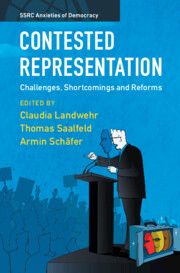Book contents
- Contested Representation
- SSRC Anxieties of Democracy
- Sponsored by the Social Science Research Council
- Contested Representation
- Copyright page
- Contents
- Figures
- Tables
- Contributors
- Acknowledgments
- 1 Introduction
- Part I The Contested Idea of Political Representation
- Part II Representation and Responsiveness in Unequal Societies
- 7 Reconsidering Representation
- 8 All about the Middle Class?
- 9 Unequal Representation and the Right-Wing Populist Vote in Europe
- 10 What Do Voters Think about the Descriptive Underrepresentation of the Working Class?
- Part III Polarization, New Cleavages, and Shifts in Democratic Government
- Part IV Constitutional Crisis and Institutional Reform
- Bibliography
- Index
10 - What Do Voters Think about the Descriptive Underrepresentation of the Working Class?
from Part II - Representation and Responsiveness in Unequal Societies
Published online by Cambridge University Press: 03 November 2022
- Contested Representation
- SSRC Anxieties of Democracy
- Sponsored by the Social Science Research Council
- Contested Representation
- Copyright page
- Contents
- Figures
- Tables
- Contributors
- Acknowledgments
- 1 Introduction
- Part I The Contested Idea of Political Representation
- Part II Representation and Responsiveness in Unequal Societies
- 7 Reconsidering Representation
- 8 All about the Middle Class?
- 9 Unequal Representation and the Right-Wing Populist Vote in Europe
- 10 What Do Voters Think about the Descriptive Underrepresentation of the Working Class?
- Part III Polarization, New Cleavages, and Shifts in Democratic Government
- Part IV Constitutional Crisis and Institutional Reform
- Bibliography
- Index
Summary
In most democracies, politicians tend to be vastly better off than the citizens they represent: They are wealthier, more educated, and less likely to come from working-class jobs (e.g., Best 2007; Best and Cotta 2000; Carnes and Lupu 2015; Matthews 1985). Scholars have recently taken a renewed interest in this longstanding phenomenon. Some have studied the symbolic or normative implications of the shortage of politicians from the working class (e.g., Arnesen and Peters 2018; Barnes and Saxton 2019; Mansbridge 2015). Others have focused on policy: Just as the shortage of female and racial minority politicians can affect policies related to gender and race (e.g., Bratton and Ray 2002; Franck and Rainer 2012; Pande 2003; Swers 2002), the shortage of working-class politicians – who tend to be more leftist on economic issues – seems to bias taxing and spending policies towards the more conservative positions affluent citizens tend to favor (Carnes and Lupu 2015; Kirkland 2018; Kraus and Callaghan 2014; Micozzi 2018; O’Grady 2019; Rosset 2016; Szakonyi 2016; 2019; but see Lloren, Rosset, and Wüest 2015).
- Type
- Chapter
- Information
- Contested RepresentationChallenges, Shortcomings and Reforms, pp. 165 - 184Publisher: Cambridge University PressPrint publication year: 2022
- 1
- Cited by

